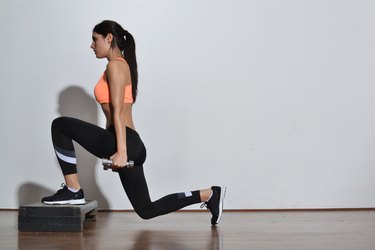
Fat makes friends with people in different places. Some folks are apple-shaped and accumulate padding around the middle, while others are pear-shaped and pack it on below the waist. The pear-shaped can rejoice that junk in the trunk puts you at lower risk for cancer, diabetes and other problems.
Of course, there's a trade-off. The fat below the waist is subcutaneous fat, which is harder — but not impossible — to lose. With determination and patience, though, most people can make great strides toward trimming down their tail ends.
Video of the Day
Video of the Day
"Permanently" is, of course, a big word, so get ready, because serious butt reduction requires a multi-pronged approach. For this project to happen, diet and exercise need to work together.
Read more: The Top 15 Moves to Tone Your Glutes
Putting Fat on the Fire
Here's the skinny on fat behinds: If you need to lose more than a few pounds, the heavy lifting is going to happen through diet more than exercise. Losing weight mostly comes down to the ratio of calories consumed to calories burned.
To lose 1 pound, you must burn 3,500 calories more than you ingest. Cutting 500 to 1,000 calories a day works out rather neatly because it puts you in the National Institutes of Health's guidelines for a safe rate of weight loss. (Lose weight too fast, and you run the risk of rebound weight gain and other difficulties.)
It's important to keep in mind that you won't necessarily lose weight in your butt first, even if you think it's the fattest part of your body. Alas, "spot reduction" is a myth!
So where to begin? First limit highly-processed foods, sugar and refined starches from your diet to the greatest extent possible. Next, there's something about eating more vegetables that seems to support weight loss, and that's independent of calories, according to the European Journal of Clinical Nutrition. And if nothing else, vegetables are low in calories, high in nutrients and usually require a lot of chewing so they provide a great deal of satiation.
Counting calories is certainly a science, but it's one that can be turned into an art. Make a point of counting your calories with a calorie calculator app and you'll soon be able wing it with confidence.

Put Your Butt to Work
Your butt is comprised of three muscles: the gluteus maximus, medius and minimus. While the gym is loaded with equipment to work each of them, you can start right now at home by doing squats, which along with lunges, are the two best exercises for firming up the buttocks, according to the American Council on Exercise.
According to ACE, though, you won't see an eye-catching change of shape unless you step it up with some cardio. ACE highly recommends vigorous uphill walking as the easiest and best way to combing burning fat with aerobic activity while shaping the muscles with anaerobic work.
While there's no such thing as "spot reduction" — targeting a single area for fat-loss — there is some promising evidence that the right kind of exercise can help shrink those fat cells.
According to the Journal of Obesity, High Intensity Interval Training (HIIT) appears to stimulate subcutaneous fat loss. HIIT is a method of aerobic training that has a post-workout halo effect of elevating the metabolism. This leads to greater insulin sensitivity and more calorie-burning.
Read more: 5 Things You Should Know About Liposuction
- American Council on Exercise: Glute Bridge
- American Council on Exercise: Stability Ball Reverse Extensions
- American Council on Exercise: American Council on Exercise (ACE) Certified Professionals Say Do More Squats, Lunges
- ExRx.net: Barbell Squat
- American Council on Exercise: Body Types
- International Journal of Obesity: The effects of high-intensity intermittent exercise training on fat loss and fasting insulin levels of young women
- American Council on Exercise: best butt-busting exercises